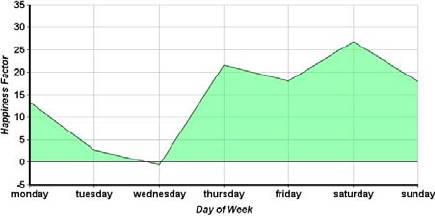Our study is based on a collection of blogposts from LiveJournal.com, annotated with happy and sad moods. Every blog community practices a different genre of writingâ from our experience, LiveJournal.com blogs more closely recount the goings-on and happenstance of everyday life than any other blog communityThe study looked at both words and posting times, and used Bayesian techniques to find patterns, and compared the findings against a similar word ranking named ANEW, based on clinical studies, coming up with some interesting (and sometimes surprising) conclusions:
For instance, a topic that is often talked about in relation to happiness is love. In fact, looking up the ANEW list of words, love ranks the third out of 1034 words, with a high 87.2 pleasure factor. Instead, the word love in our list is neutral, with a happiness factor of only 48.7. Moreover, a morphological variation of the same word, loved, is ranked similarly high in the ANEW list (86.4), but it is marked as a sad word in our list (28.1). The only happy variation of this word is lovely, which has a happiness factor of 77.3 (this word does not appear in the ANEW list). What these rankings suggest is that the stereotypical view of love (the public view) is that of a happy word (the ANEW ranking), but the more private view of this word is neutral, due to a balanced distribution of this concept in both happy and sad moments.
There are also several examples of words in our list that have a high happiness factor, and yet they are not even listed in the ANEW list of words. For instance, shopping (79.5) and bought (69.9), are two of the highly ranked words in our list. Similarly, food related events (lunch (73.1), dinner (72.1) food (65.0), drink (64.4), etc.) have a high happiness factor, with only two of these concepts (dinner and food) being mentioned in the ANEW list. Another interesting example that has a positive happiness load in our list is drunk (59.1), which is most likely not one of the most widely publicly admitted states of happiness.
 The study also charted the occurrence of happiness by time of day and week (finding that happiness is at a low at around 8am, as people are wrenched from their blissful sleep to face the drudgery of the world), and peaks at 2-4am (presumably because of the nocturnal habits of LiveJournallers); on a weekly chart, happiness peaks on Saturday and then dives, reaching a low on Wednesday before climbing back for the weekend. Which shows that anticipation plays a big part in one's immediate happiness.
The study also charted the occurrence of happiness by time of day and week (finding that happiness is at a low at around 8am, as people are wrenched from their blissful sleep to face the drudgery of the world), and peaks at 2-4am (presumably because of the nocturnal habits of LiveJournallers); on a weekly chart, happiness peaks on Saturday and then dives, reaching a low on Wednesday before climbing back for the weekend. Which shows that anticipation plays a big part in one's immediate happiness.
Other observations in the paper: sad posts include more actions (presumably because of a tendency to write about bad things that happened) and "human-centred" words (the latter presumably because depression involves thinking about one's woeful lot in life, whereas happiness doesn't), whereas happy posts include more descriptions of things and "social" words. Also, the study answers Jens Lekman's question about birthdays in the affirmative, with the word "birthday" having a high happiness score. And whilst loving a person is likely to make one sad, loving a thing makes one happy, because we've all got a little bit of Gollum inside:
A large fraction of the bigrams with low happiness factor are centered around humans, i.e. miss you, I hate, I wish, for him, you were, etc. An observation in the same vein can be drawn from the ranking of three-grams, where facts revolving around love are related to humans in the top sad three-grams, I love him (37.33), I love you (37.09), but refer to objects in the three-grams with high happiness factor: I love it (85.00), I love the (82.85), I love that (68.62). This reinforces the findings from the previous section, which showed that expressions of sad feelings are more often human-centered than the happy feelings.The authors conclude with a recipe for happiness, based on their findings:
Go shop for something new — something cool, make sure that you love it. Then have lots of food, for dinner preferably, as the times of breakfast and lunch are to be avoided. Consider also including a new, hot taste, and one of your favorite drinks. Then go to an interesting place, it could be a movie, a concert, a party, or any other social place. Having fun, and optionally getting drunk, is also part of the recipe. Note that you should avoid any unnecessary actions, as they can occasionally trigger feelings of unhappiness. Ideally the recipe should be served on a Saturday, for maximum happiness effect. If all this happens on your birthday, even better.
I reckon this might well be a case of angsty teenager ascertainment bias.